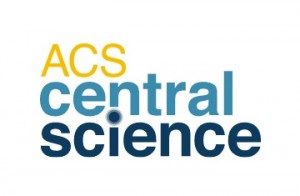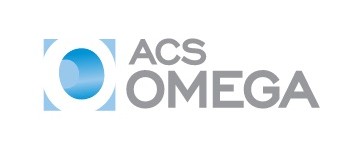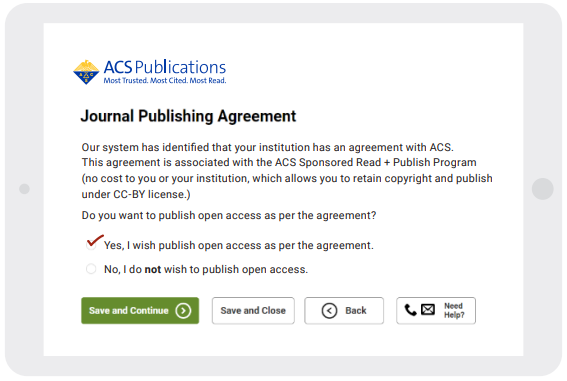Polish Academic Consortia
Poland
Which ACS journals are included in this agreement?
The table below shows the ACS journals where your article publishing charge (APC) should be covered by your institution. Unless otherwise stated, this agreement covers 100% of the APC.
| Journal / Collection | Included in Agreement? | |
|---|---|---|
 | ACS Central Science | Diamond open access: Free to publish and read |
 | ACS Omega | |
 | ACS Au family (including JACS Au) | |
       | Artificial PhotosynthesisChem & Bio EngineeringChemical & Biomedical ImagingEnvironment & HealthPhoton SciencePolymer Science & TechnologyPrecision Chemistry | Waivers available: see individual journals for information |
| ACS hybrid journals | ||
Publish open access at no cost
If you are associated with any of the institutional accounts below and are the submitting corresponding author, you may have the opportunity to publish your research in any ACS journal under a CC BY open access license with your institution’s support.
Access to all ACS journals
In addition to open access publication benefits, participants in this special agreement will have full-text access to all current ACS Publications journal content.
Scroll down to find out how to publish open access at no cost under this agreement.
Participating institutions
| Institution Name | Institution Name | Institution Name |
|---|---|---|
| Adam Mickiewicz University Poznań University | Institute of Physics, Polish Academy of Sciences | Rzeszow University of Technology |
| AGH University of Science and Technology | Jagiellonian University | Silesian University of Technology |
| Centre of Molecular and Macromolecular Studies, Polish Academy of Sciences | Jan Dlugosz University in Czestochowa | Tadeusz Kosciuszko Cracow University of Technology |
| Centre of Polymer and Carbon Materials, Polish Academy of Sciences | Jerzy Haber Institute of Catalysis and Surface Chemistry, Polish Academy of Sciences | University of Bialystok |
| Gdańsk University of Technology, Polish Academy of Sciences | Lodz University of Technology | University of Gdansk |
| Henryk Niewodniczański Institute of Nuclear Physics, Polish Academy of Sciences | Łukasiewicz Research Network - PORT Polish Center for Technology Development | University of Life Sciences, Lublin |
| Institute of Agrophysics, Polish Academy of Sciences | Maria Curie-Sklodowska University | University of Lodz |
| Institute of Biochemistry and Biophysics, Polish Academy of Sciences | Medical University of Bialystok | University of Science and Technology Bydgoszcz |
| Institute of Chemical Engineering | Medical University of Lodz | University of Silesia |
| Institute of Environmental Protection, National Research Institute | Medical University of Lublin | University of Warsaw |
| Institute of Heavy Organic Synthesis Blachownia | Medical University of Silesia | University of Wroclaw |
| Institute of Low Temperature and Structural Research, Polish Academy of Sciences | Medical University of Warsaw | University of Zielona Gora |
| Institute of Molecular Physics, Polish Academy of Sciences | Military University of Technology | Warsaw University of Technology |
| Institute of Nuclear Chemistry & Technology | Nencki Institute of Experimental Biology, Polish Academy of Sciences | West Pomeranian University of Technology |
| Institute of Organic Chemistry, Polish Academy of Sciences | Nicolaus Copernicus University in Torun | Wroclaw Medical University |
| Institute of Organic Industry | Opole University | Wroclaw University of Economics and Business |
| Institute of Physical Chemistry, Polish Academy of Sciences | Poznan University of Technology | Wroclaw University of Science and Technology |
I’m a prospective author, how do I publish open access?
Step 1
Submit your article to the ACS journal of your choice, making sure you are the submitting corresponding author.
Step 2
Ensure your institution affiliation is correct on your profile in the ACS Publishing Center.
Step 3
Check that your affiliation is stated in the body of the manuscript as the corresponding author’s affiliation.
Step 4
When your manuscript has been accepted for publication, you will be automatically prompted with the option to publish open access under your institution’s agreement.
Step 5
Note: Authors publishing in a gold (fully open access) journal will not be required to complete this step.Confirm that “Yes, I wish to publish open access as per the agreement” is checked, and complete the Journal Publishing Agreement.

Step 6
Your institution will be alerted to your open access funding request. If the request is approved, your article will be made immediately available as open access upon publication under a Creative Commons CC BY 4.0 license. There are no charges to pay and no further action required by either you or your institution.
Video demonstration
This demo video shows you how to navigate the Journal Publishing Agreement assistant and publish your research open access under your institutional open access agreement:
Automatic article deposit
Authors who elect to publish open access will automatically have their final published article sent for deposit in PubMed Central. Please note all contents accepted for US PubMed Central are automatically mirrored on Europe PMC — nothing more is required on your part. Authors publishing open access under this agreement are also free to deposit their accepted manuscript in their institutional and/or research funder’s designated open access repository.
Immediate public access to research
Some research funders require authors to make a version of their research article available in a public open access repository immediately upon publication.
You may see this referred to as ‘zero-embargo green open access’.
If you receive funding from an organization with a zero-embargo green open access policy, then your funder may require you to make a version of your manuscript available in an open access repository immediately upon publication. You will need to check the terms of your grant, and/or communicate with your grant officer, to confirm if such a policy applies to your work.
Publishing open access through your institution’s read and publish agreement is compliant with these mandates. ACS Publications will automatically submit the version of record of your article to PubMed Central, and you and your co-authors are free to post your accepted manuscript to any other repository or service required by your funder(s). Combined with public access to your research data, this will ensure compliance with any applicable zero-embargo green open access policy.
For authors who do not already benefit from a read and publish agreement, ACS Publications’ zero-embargo green open access option expands the choices beyond the free 12-month embargo route for those authors to comply with funder mandates by posting their accepted manuscript with a CC BY license to a repository immediately upon acceptance, following payment of an article development charge (ADC).